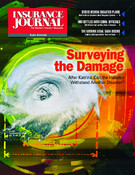Hurricane Katrina is the largest natural disaster to strike this nation in more than a century. As the search for survivors and the delivery of aid continue, the task of understanding the scope of this tragedy has just begun.
Insurance claims adjusters and agents will, of course, do their part to help as they always do. To its credit, the insurance industry has focused on the job of getting relief to victims as quickly as possible and left the political posturing to others.
Long after the rest of us are back to our routines, the disaster victims will be still trying to piece together their lives, emotionally and materially. With 80 per cent of the city of New Orleans submerged under water and most hospitals closed, delivery of medical supplies and personnel to the region will be a major challenge for some time to come. Public health experts are warning about the security of the food supply, sanitation, and the outbreak of diseases like cholera and typhoid are top public concerns.
There will, of course, be major economic consequences, and not just for the insurance industry. The Gulf Coast supplies almost one quarter of the country’s oil. Reports indicate that 20 oil rigs in the Gulf of Mexico were destroyed. The resulting spiking in the price of gasoline will have widespread impact. Hundreds of thousands of jobs are affected.
Environmentally, experts report that much of the water flooding New Orleans is contaminated. Eventually, it will be necessary to consider the impact of this disaster on the wildlife and wetlands.
It will take years to rebuild the Gulf Coast. With interstate roads and bridges leading to New Orleans in ruins, the telecommunications system crippled, and utilities warning of months of power outages, urban engineers face a monumental task.
Insurance can measure some of the economic loss but it cannot gauge the full depth and breadth of the suffering. Insurance can point the nation in the direction of what needs to be done but it cannot, by itself, restore all that has been lost. Nor can the profit and nonprofit sectors, by themselves, provide all the comfort, aid, tools and energy that will be required. Government may not be the answer to every problem, as many in the insurance industry know, but in a crisis such as this the public sector is an indispensable leader and provider.
Those of us fortunate enough to be removed from the pain and suffering will be watching to see not how the insurance industry, the private sector, the nonprofit sector or the public sector perform separately, but how they perform as a team for Americans in need.
bold1
bold2
ital
• bullet
Topics Market
Was this article valuable?
Here are more articles you may enjoy.


 Q4 Global Commercial Insurance Rates Drop 4%, in 6th Quarterly Decline: Marsh
Q4 Global Commercial Insurance Rates Drop 4%, in 6th Quarterly Decline: Marsh  Chubb Posts Record Q4 and Full Year P/C Underwriting Income, Combined Ratio
Chubb Posts Record Q4 and Full Year P/C Underwriting Income, Combined Ratio  After Falling 6% in 2025, Average Auto Insurance Cost Will Stabilize in 2026, Says Insurify
After Falling 6% in 2025, Average Auto Insurance Cost Will Stabilize in 2026, Says Insurify  What Analysts Are Saying About the 2026 P/C Insurance Market
What Analysts Are Saying About the 2026 P/C Insurance Market 


